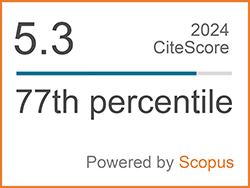Optimization of Semi-batch Reactive Distillation Using Response Surface Method: Case Study of Esterification of Acetic Acid with Methanol in a Process Simulation
Abstract
An optimization method was applied to determine optimal operating parameters on Reactive Distillation column (RD column) via esterification of acetic acid with methanol to produce methyl acetate using Aspen Batch Distillation. The set-up reactive distillation model was adopted from an in-house made RD column, which comprised of seven stages including reboiler and condenser, five possible feed stages, where solid catalyst for the reaction was contained. In this work, effect of temperature of heater at reboiler, feed stage and reflux rate on yield of methyl acetate and purity of total distillated product were studied. Case studies were designed by design of experiment and consequently simulation results were optimized by using Response Surface Methodology (RSM) to determine optimal condition. The results indicated that the optimum temperature of heater at reboiler, feed stage and reflux rate were 141.87°C, Stage4 and 332.48 mol·h–1, respectively, giving maximum yield and purity of methyl acetate at 57.50 mol% and 80.46 wt%, respectively.
Keywords
DOI: 10.14416/j.ijast.2018.11.001
Refbacks
- There are currently no refbacks.
 Applied Science and Engineering Progress
Applied Science and Engineering Progress







